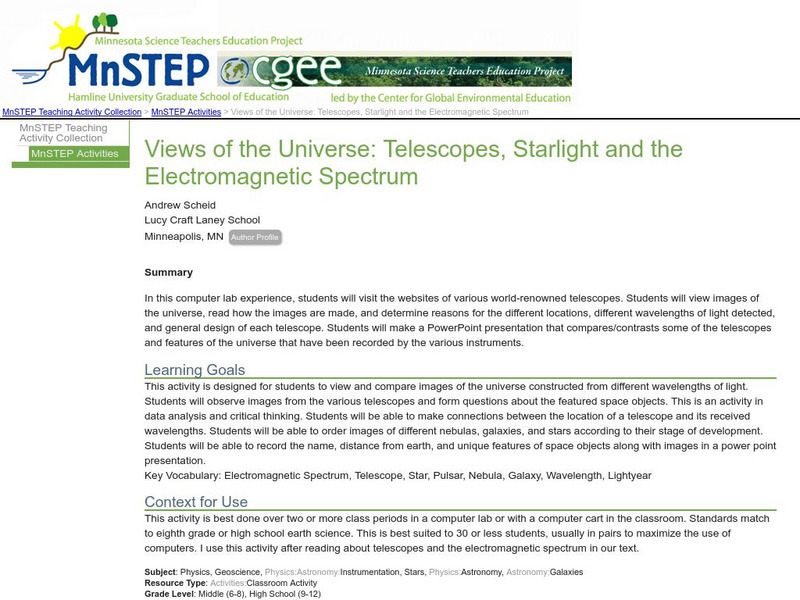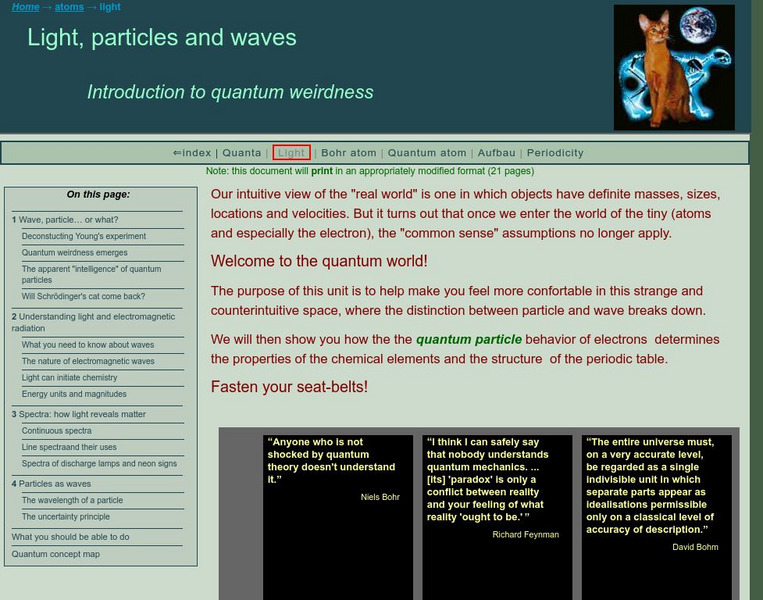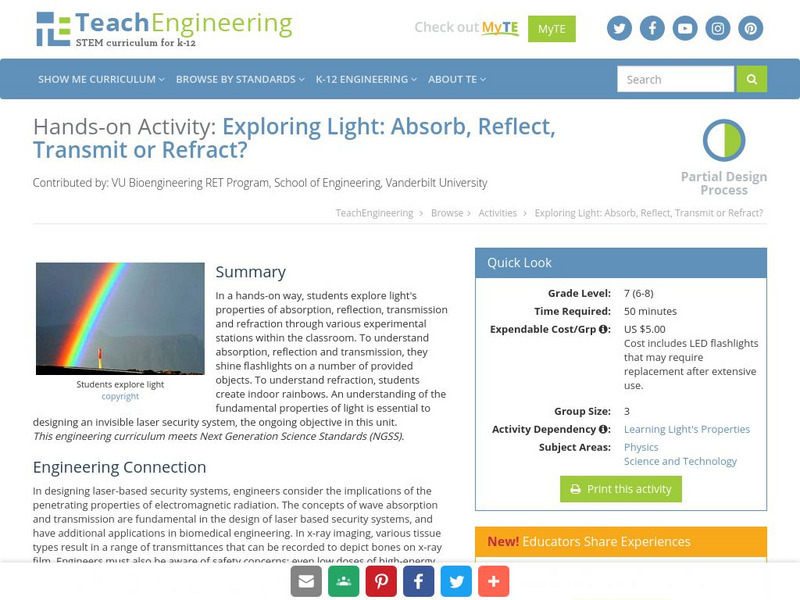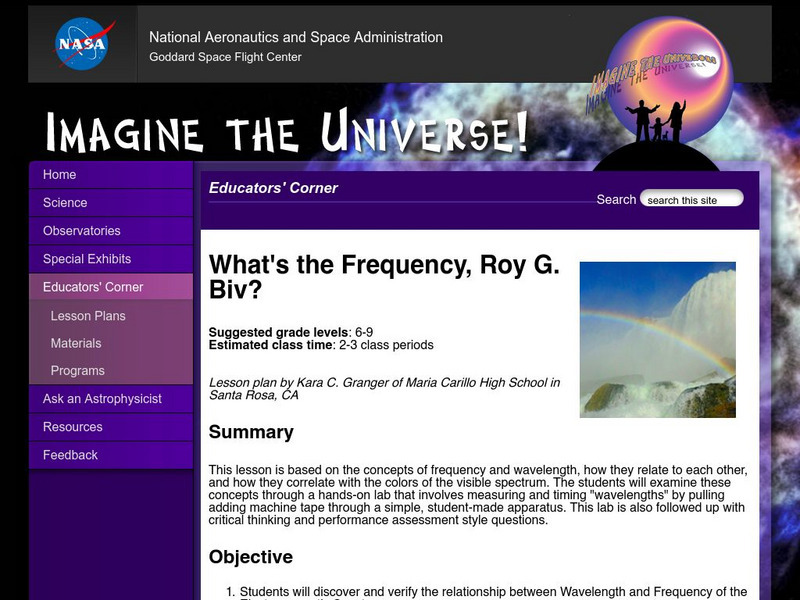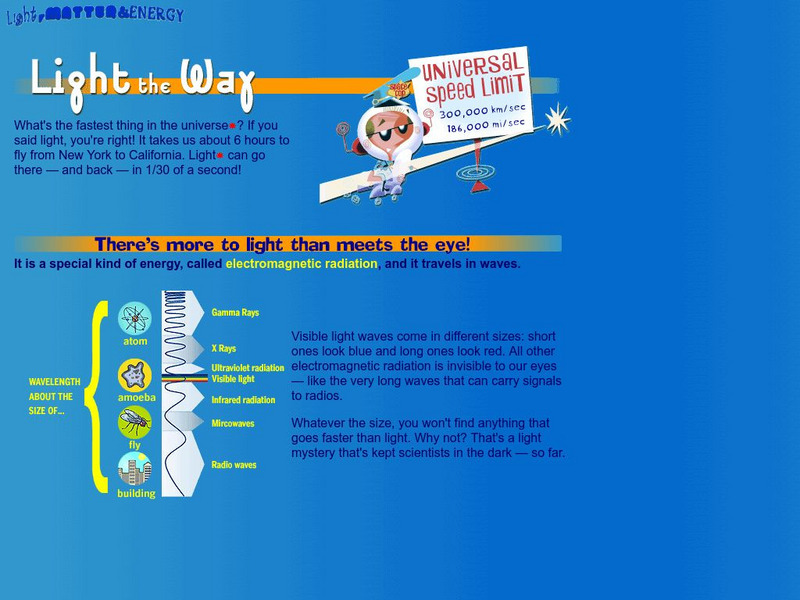Hi, what do you want to do?
NASA
Nasa: Space Place: The Electromagnetic Spectrum
Find out how energy, frequency, and wavelength are related in terms of the electromagnetic spectrum.
Science Education Resource Center at Carleton College
Serc: Views of the Universe: Telescopes, Starlight, Electromagnetic Spectrum
Students visit the websites of various world-renowned telescopes, view images of the universe, read how the images are made, and determine reasons for the different locations, different wavelengths of light detected, and general design...
Simon Fraser University
Chem1 Virtual Textbook: Light and Electromagnetic Radiation
In discussing the findings of James Clerk Maxwell and Michael Faraday, this site reveals information and formulas related to electromagnetic radiation and the electromagnetic spectrum.
TeachEngineering
Teach Engineering: The Energy of Light
In this introduction to light energy, students learn about reflection and refraction as they learn that light travels in wave form. Through hands-on activities, they see how prisms, magnifying glasses and polarized lenses work. They also...
TeachEngineering
Teach Engineering: The Visual Spectrum
In this activity, students make simple spectroscopes (prisms) to look at different light sources. The spectroscopes allow students to see differing spectral distributions of different light sources.
ClassFlow
Class Flow: Visible Light and the Electromagnetic Spectrum
[Free Registration/Login Required] This flipchart introduces fifth grade students to the electromagnetic spectrum and focuses on the visible light spectrum, but all types of energy waves in the electromagnetic spectrum are touched on. It...
Other
Tooter4kids: Light and Color
You'll find a wealth of resources at this site dedicated to color! Easy-to-read discussions can be found on topics ranging from the science of light to complementary colors and the color wheel. All special terms are highlighted and...
TeachEngineering
Teach Engineering: Exploring Light: Absorb, Reflect, Transmit or Refract?
In a hands-on way, students explore light's properties of absorption, reflection, transmission and refraction through various experimental stations within the classroom. To understand absorption, reflection and transmission, they shine...
NASA
Nasa: Imagers: The Electromagnetic Spectrum
NASA site provides information on waves, electromagnetic waves and their wavelengths.
Georgia State University
Georgia State University: Hyper Physics: Color
This site from Georgia State University discusses the location of visible light on the electromagnetic spectrum. Includes the wavelength values for various colors of light within the visible light spectrum.
Science Struck
Science Struck: Emission Spectrum vs. Absorption Spectrum
Explains the difference between an emission spectrum and an absorption spectrum, and describes each as well as their applications.
Physics Classroom
The Physics Classroom: Refraction/ray Model of Light: Light Dispersion Prisms
A tutorial which introduces students to the dispersion of light in more detail, and investigates the reasons why different frequencies of light bend or refract different amounts when passing through the prism.
NASA
Nasa: Imagine the Universe: What's the Frequency, Roy G. Biv
In this very detailed lesson plan from NASA, learners investigate wavelength and frequency within the electromagnetic spectrum.
Physics Central
Physics Central: Physics in the Snow: Snowy Colors
A simple experiment through which students observe the connection between color and heat and prove that dark-colored objects and light-colored objects heat at different rates, even when exposed to the same heat or light source.
University of Colorado
University of Colorado: Physics 2000: Temperature and Absolute Zero
A thorough, multipage discussion of color and color television sets that explains how an image is formed on the television using red, green, and blue light. Understandable discussion, excellent graphics, and many interactive Java applets.
Physics Classroom
The Physics Classroom: Light Waves and Color: Blue Skies and Red Sunsets
Students will focus on the interaction of sunlight with atmospheric particles to produce blue skies and red sunsets.
American Museum of Natural History
American Museum of Natural History: O Logy: Light, Matter, Energy: Light the Way
What is electromagnetic radiation and how does it work? Review a captioned graphic that explains electromagnetic radiation and the visible and invisible types of radiation on the electromagnetic spectrum.
Science Struck
Science Struck: Wavelength of Light
Describes the characteristics of light, presents two formulas for calculating its wavelength, and provides a table of the different wavelength ranges across the electromagnetic spectrum.
Science4Fun
Science4 Fun: Light
What is light? Illustrated discussion of the speed of light, how we see colors, and how light helps us.
Sophia Learning
Sophia: Light Waves: Lesson 1
This lesson will introduce light waves and describe how a particle can travel as a photon or a wave. It is 1 of 4 in the series titled "Light Waves."
Sophia Learning
Sophia: Light Waves: Lesson 3
This lesson will introduce light waves and describe how a particle can travel as a photon or a wave. It is 3 of 4 in the series titled "Light Waves."
Khan Academy
Khan Academy: Light: Electromagnetic Waves, Electromagnetic Spectrum and Photons
This article discusses the properties of electromagnetic radiation and photons.
Science Education Resource Center at Carleton College
Serc: How Can We Measure the Wavelength of Light Emitted From Stars?
This activity is designed for students to apply their knowledge of mathematics and physics to "real life" situations. Students are presented with the situation that they are on a camping trip and wish to know the wavelength emitted by a...
NASA
Electromagnetic Spectrum: Ultraviolet Waves
Ultraviolet (UV) light has shorter wavelengths than visible light. Though these waves are invisible to the human eye, some insects can see them. The specific wavelength values are given. Uses and applications of these waves are explained.
Other popular searches
- Visible Light Spectrum
- Light Spectrum Stars
- Light Spectrum Waves
- Light Spectrum Activity
- Light Spectrum and Colors
- Light Spectrum and Waves
- Newton's Light Spectrum
- Light Spectrum \ Stars
- Spectrum of Light
- Spectrum Light






